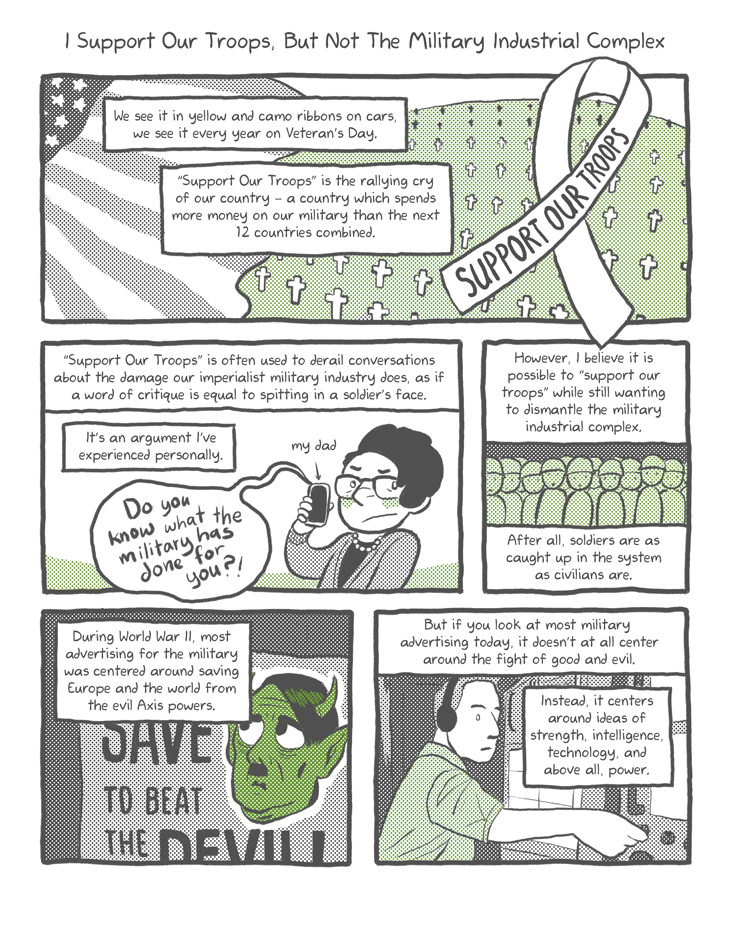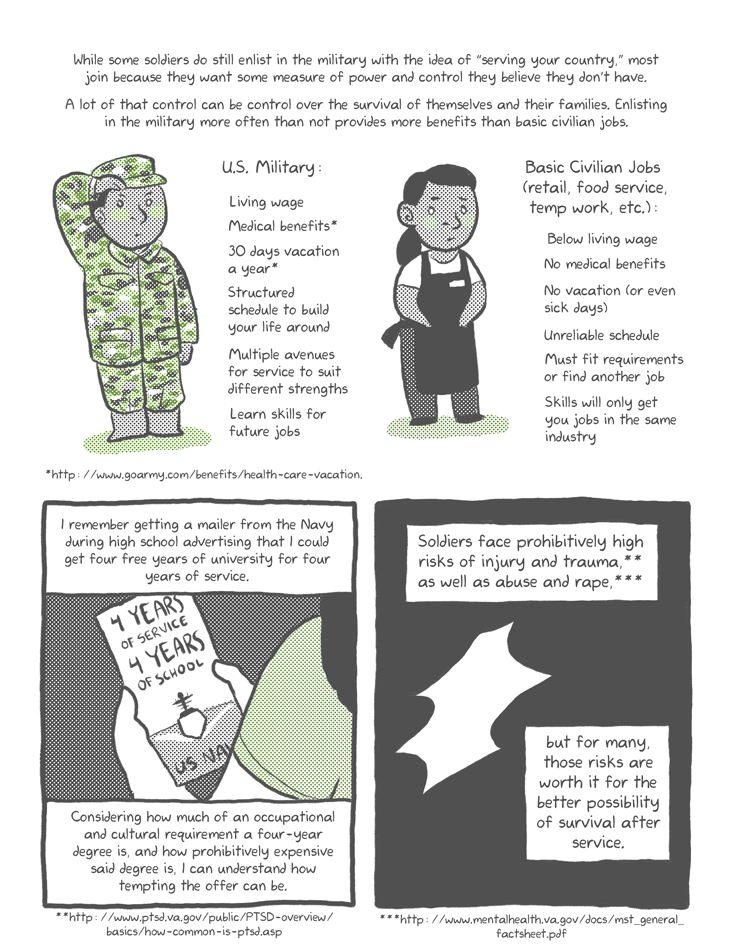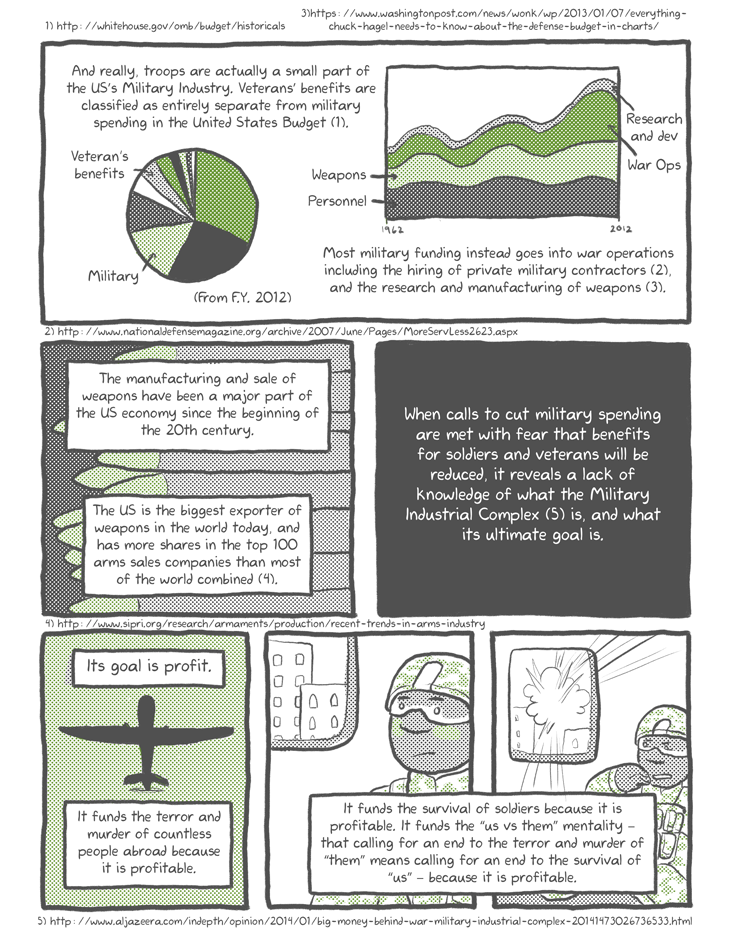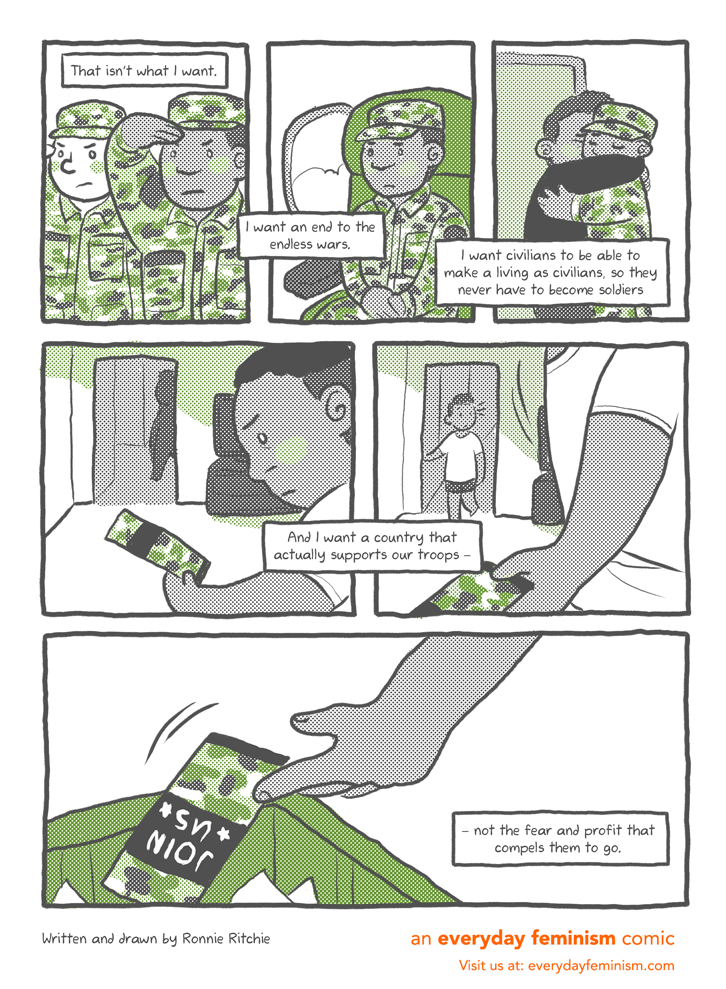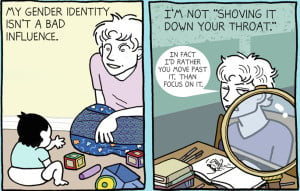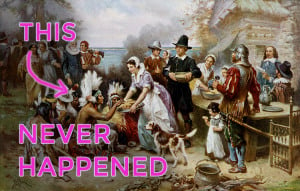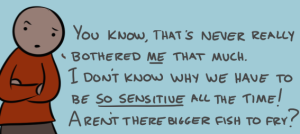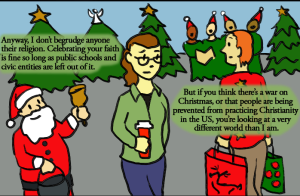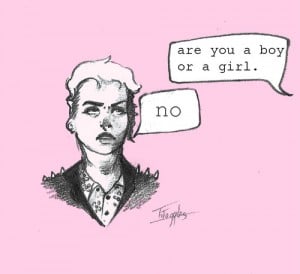Panel 1
(Images of an American flag, iconic Normandy gravestones, and the “Support Our Troops” ribbon)
Text: We see it in yellow and camo ribbons on cars, we see it every year on Veteran’s Day. “Support Our Troops” is the rallying cry of our country – a country which spends more money on our military than the next twelve countries combined.
Panel 2
Text: “Support Our Troops” is often used to derail conversations about the damage our imperialist military industry does, as if a word of critique is equal to spitting in a soldier’s face.
(Image of Ronnie leaning away from their cell phone, words spilling out of the speaker. An arrow labels the cell phone as “My Dad.”)
Dad: Do you realize what the military has done for you?
Text: It’s an argument I’ve experienced personally.
Panel 3
(A crowd of soldiers in helmets, entirely green as if they are plastic toy soldiers)
Text: However, I believe it is possible to “support our troops” while still wanting to dismantle the military industrial complex. After all, soldiers are as caught up in the system as civilians are.
Panel 4
(Image of a World War II propaganda poster, featuring a caricature of Hitler with devil horns and the words “SAVE to beat THE DEVIL!” )
Text: During World War II, most advertising for the military was centered around saving Europe and the world from the evil Axis powers.
Panel 5
(Image of a member of the Navy working a set of dials in a submarine)
Text: But if you look at most military advertising today, it doesn’t at all center around the fight of good and evil. Instead, it centers around ideas of strength, intelligence, technology, and above all, power.
Panel 6
Text: While some soldiers do still enlist in the military with the idea of “serving your country,” most join because they want some measure of power and control they believe they don’t have. A lot of that control can be control over the survival of themselves and their families. Enlisting in the military more often than not provides more benefits than basic civilian jobs.
(Two examples of one person with long black hair in a ponytail stand next to each other. One is wearing military fatigues and saluting while the other is wearing a retail smock.)
Text: Military:
Basic Civilian Jobs (retail, food service, temp work, etc.):
- Below living wage
- No medical benefits
- No vacation (or even sick days)
- Unreliable schedule
- Must fit requirements or find another job
- Skills will only get you jobs in the same industry
Panel 8
(Young Ronnie holds a US Navy flyer featuring a ship on the ocean and the words “4 Years of Service, 4 Years of School”)
Text: I remember getting a mailer from the Navy during high school advertising that I could get four free years of university for four years of service. Considering how much of an occupational and cultural requirement a four-year degree is, and how prohibitively expensive said degree is, I can understand how tempting the offer can be.
Panel 9
(There is a flash in a dark room, like an impact.)
Text: Soldiers face prohibitively high risks of injury and trauma, as well as abuse and rape, but for many, those risks are worth it for the better possibility of survival after service.
Panel 10
(Two graphs sit next to each other. The first is a break down of the United States budget from the 2012 fiscal year. Two of the sections are labeled “Military” and “Veterans’ benefits.” The second graph is a breakdown of defense spending by the United States from 1962 to 2012. The section labeled “Personnel” has remained fairly even over the years, whereas the sections labeled “Weapons,, “War Ops,” and “Research and Development” have grown over time, taking up a majority of defense spending at the end.)
Text: And really, troops are actually a small part of the US’s Military Industry. Veterans’ benefits are classified as entirely separate from military spending in the United States Budget. Most military funding instead goes into war operations including the hiring of private military contractors, and the research and manufacturing of weapons.
Panel 11
(A stack of missiles sits against a dark background.)
Text: The manufacturing and sale of weapons have been a major part of the US economy since the turn of the 20th century. The US is the biggest exporter of weapons in the world, and has more shares in the top 100 arms sales companies than most of the world combined.
Panel 12
Text: When calls to cut military spending are met with fear that benefits for soldiers and veterans will be reduced, it reveals a lack of knowledge of what the Military Industrial Complex is, and what its ultimate goal is.
Panel 13
(There is the silhouette of a drone from below.)
Text: Its goal is profit. It funds the terror and murder of countless people abroad because it is profitable.
Panel 14-15
(A person in combat fatigues sits on the floor of an empty room next to a window with other buildings in view. In the next panel, one of the buildings visible through the window explodes. The soldier puts up a hand in reflex.)
Text: It funds the survival of soldiers because it is profitable. It funds the “us versus them” mentality – that calling for an end to the terror and murder of “them” means calling for an end to the survival of “us” – because it is profitable.
Panel 16
(The person is standing in a line of soldiers in standard fatigues, performing a salut.)
Text: That isn’t what I want.
Panel 17
(The person is in the same fatigues, sitting in the chair of a civilian plane and watching the clouds through the window with a sad expression.)
Text: I want an end to the endless wars.
Panel 18
(The person is at their doorstep, hugging his partner goodbye.)
Text: I want civilians to be able to make a living as civilians, so they never have to become soldiers.
Panel 19-20
(The person is in a plain t-shirt and boxers, sitting in the living room of his home and pondering a recruitment pamphlet for the army. In the next panel, he stands up with the pamphlet in hand. His partner appears in the doorway, noticing the person’s movement.)
Text: And I want a country that actually supports our troops—
Panel 21
(The person tosses the pamphlet into a recycling bin, never to look at it again.)
Text: —not the fear and profit that compels them to go.


